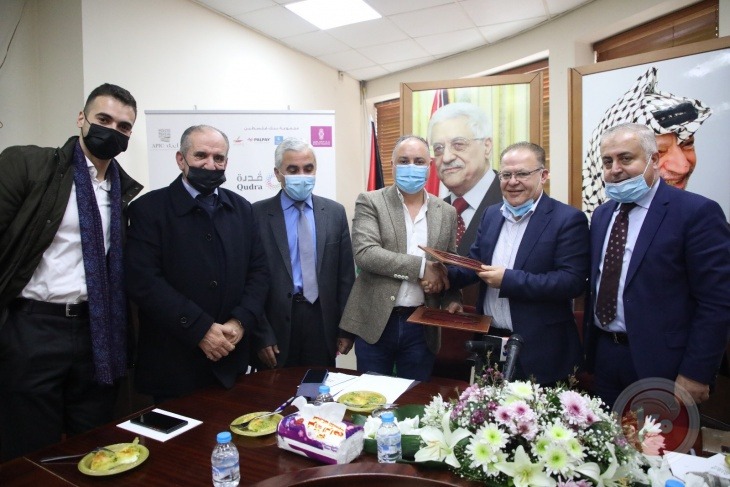To contribute to paying the deficit and meeting the increasing consumption of electricity energy
Last Tuesday, the Nablus Municipality and Qudra Renewable Energy Company signed a Memorandum of Understanding to finance, design, and operate solar plants on the municipality’s lands, in order to contribute to generating electric power to pay the deficit and meet the increasing consumption of energy in Nablus. The Memorandum of Understanding was signed between Eng. Iyad Khalaf, Chairman of the Nablus Municipal Committee, and Eng. Anan Anabtawi, Chairman of Qudra.

Under the Memorandum of Understanding, Qudra will bear all costs for financing, designing, and operating solar power plants that will be built on municipal lands in Nablus Governorate with a capacity of up to 10 megawatts during the first phase, and authorizing the Northern Electricity Distribution Company to recycle the Nablus municipality’s share of the plant’s output to its account in the company.
Eng. Khalaf stated: “The Nablus Municipality praises this important step and initiative on the part of Qudra, to establish solar energy plants on municipality lands, which will benefit citizens, as such projects have positive effects on local development and raise the capabilities of this Council to provide better services to the public and provide additional investment opportunities in light of the availability of alternative energy.” “This project is in line with the directions of the Palestinian leadership to disengage from the Israeli occupation and reduce dependence on it,” added Khalaf.
Khalaf also commended the establishment of such vital projects that would pave the way for power generation to contribute to obtaining clean energy, calling on local government bodies and institutions to follow the example of the Nablus Municipality in establishing solar power plants, considering the positive impact of such projects on economic and community development.
Anabtawi expressed his enthusiasm about signing this Memorandum with the Municipality of Nablus to accomplish this rather important project that will benefit the municipality, its citizens, and neighboring areas, and also contribute to responding to their needs for electrical energy, especially in light of increasing demands.
Anabtawi stressed that through this agreement, Qudra seeks to implement solar energy projects in several Palestinian governorates to ensure the achievement of significant economic benefits at the national level through the use of solar energy.
Anabtawi stressed the need to establish such vital and promising projects in the various Palestinian governorates to produce electricity through solar cells and secure alternative sources of energy, which in turn contributes to creating electricity security for citizens, institutions, and local bodies, thus liberating them from the burdens of the cost of electricity consumption on the one hand, and promoting the capacity of the renewable energy sector in Palestine and supporting the Palestinian economy, on the other.
Anabtawi praised the role of the municipality to use its lands to establish the plant, hoping that the Memorandum of Understanding would create cooperation between Qudra and the municipality to establish other plants, in addition to the ones that will be built in the Nablus governorate to generate electrical energy in the future, thus contributing to serving the local community.
Engineer Anis Sweidan, the Vice Chairman of the Nablus Municipal Administration Committee, considered this project one of the largest renewable energy projects in Palestine and thanked the Nablus Municipality staff and Qudra Company for their recent efforts to conclude such an agreement.

